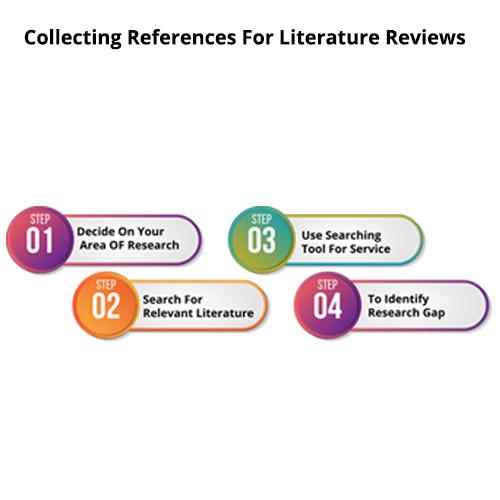How to collect references to frame literature review for PhD thesis?
In Brief
- ThePhD Framework in Literature Review is a significant academic constraint, by which one can become an expert on their topic and also extend knowledge within that particular field.
- It helps to justify your research work to the reviewer that you have a clear understanding of publication, recent journals and articles to your dissertation.
- It shows that you are aware of research theory and methodologies associated with the proposed research topic.
- It helps in justifying research work, prove its originality and to avoid plagiarism.
- Thesis reference collection help in proving the originality of the research work and shows the reader you have some knowledge in that particular research area.

Introduction
The main aim of writing any literature reviewis to obtain knowledge in the specific research area, which helps in getting a clear idea about recent works that are being carried out in that particular research area. It provides you with a brief idea about what problem currently being faced and you can get an idea about different methodologies which are now in practice. It is used to find the research gap, and it will make a way to justify your work in the research field. Always use recent publication as a reference to literature work. Google Scholar is a fascinating searching tool which helps in searching for journals and magazines. A literature review is a survey on a specific topic about scholarly sources. It presents an overview of the research area regarding current knowledge, and helps in identifying theories, methods and gaps. Main steps involved in the literature review are relevant to the paper search, help to evaluate sources, identify the research gap. A useful literature review gives explicit knowledge about the subject. But it is necessary to select the topic before the literature review. It is essential to refer to a relevant paper for literature review, search for the article related to your research objective and question—reference collection help in identifying the problem statement in your research area.
Decide on the area of research
Identifying the research area is the foremost important work before Developing PhD theoretical framework in the literature review. Searching journals, articles and conference papers help in deciding the area of research. Make sure you are searching and learning journals and articles related to your research area. It is significant to select a research area which is associated with your future career path. It will help in achieving your career goal.
Search for relevant works
The literature review is a significant academic constraint, by which one can become an expert on their topic and also extend knowledge within that field, it gives a general and specialized summary of research work related to that particular research area. It helps in justifying research work, prove its originality and to avoid plagiarism. It also aids in defending your suggested methodologies and contribution towards research. Help in showcasing the knowledge you have gained in a particular research area and to identify the research gap. There were plenty of research journals found to always try to search for work related to your problem statement. Dissertation reference collection service will provide you with relevant research work similar to your research area.
Use of a searching tool
You need to have a clear description of the research domain; then you can use Google scholar for collecting literature. Google scholar provides lots of information like scholarly journals, recent publications, recent conference papers and articles. Always use recent journals and magazines as a reference for your literature work. Because it helps to project the reader that you know the current position going on related to the topic of research. It is essential to identify keywords for researching in Google scholar, do not use generalized keywords related to your area of study, it will be useful at some time, but it might lead to repetitive and messy results. So always write whatever you want to learn from research after breaking those into subtopics after that to create keywords. In case you are not aware of the topic, use news, encyclopedia and articles as the source. Take notes from each start about methodologies, data used, the problem faced and how their proposed work helps in overcoming those problems.

Scope of literature review
There were many significant functions performed by literature reviewers, some of them are
- It proves to the reviewer that you have a clear understanding of publication, recent journals and articles to your dissertation.
- It shows that you are aware of research theory and methodologies associated with the proposed research topic.
- It supports in identifying research gaps, which helps in avoiding plagiarism.
- The knowledge gained from reviewing other work help in justifying originality of the proposed work.
- A literature review is not just a summary of publication; instead, it gives a clear understanding of the research problem and your contribution towards research.
- Sometimes the flawed literature survey leads to unacceptance of research work; it shows a lack in proving the originality.
- An in-depth literature review with many related sources of reference will increase the chance of the scientific manuscript publication in prominent and reputed scientific journals.
- Reference collection service helps you to identify references related to your dissertation research work.
Conclusion
The worth of your dissertation mainly depends on literature review, by reading the literature work the reader will understand that you have relevant knowledge over that particular research area. It also helps in overcoming plagiarism issues and proves that you have proposed original research work. While literature reviewing it is not necessary to consider the quality of reference whether it is related to your research area than considering quantity, that is how much papers you referred.
References
- Wee, B. V., & Banister, D. (2016). How to write a literature review paper?. Transport Reviews, 36(2), 278-288.
- Rosenfeldt, F. L., Dowling, J. T., Pepe, S., & Fullerton, M. J. (2000). How to write a paper for publication. Heart, Lung and Circulation, 9(2), 82-87.
- Fink, A. (2019). Conducting research literature reviews: From the internet to paper. Sage publications.

 Previous Post
Previous Post Next Post
Next Post